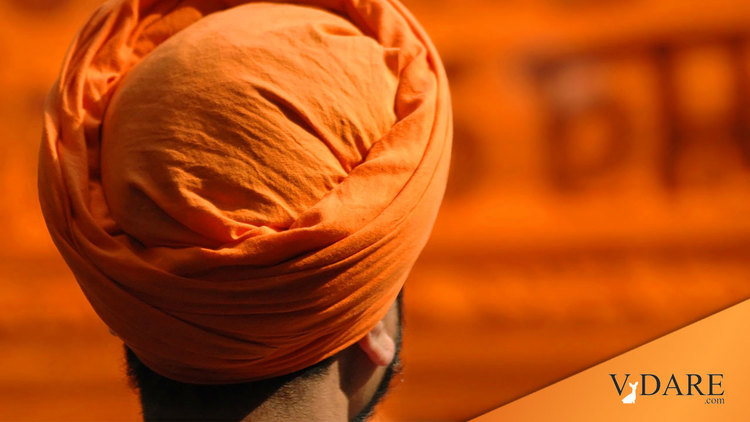


06/25/2008
You know that we aren’t dealing with just a few isolated cases of political correctness when you can find completely unrelated cases of multicultural anarcho-tyranny within the very narrow subset of immigrant hairstyles twice in three days.
On June 16, the London Daily Mail ran a piece about how the West Midlands’ police spent £100,000 trying to find proper protective head gear for a Sikh constable who wanted to join their counter-terrorism unit, but refused to take off his turban.
The department allowed finding proper headgear to be his special project. After paying him for eighteen months with no result, they transferred him back to his old position. He promptly took long term sick leave claiming “stress.”
According to their spokesperson:
West Midlands Police is a diverse organisation, which both serves and recruits from a diverse community. No Sikh officer has applied and been turned down from joining the Operational Support Unit because of faith issues. However, it has been identified that for some members of the Sikh faith, the removal of the turban to wear a helmet and the wearing of a respirator could be problematic. As an employer committed to equality and diversity, we are working to try and find a solution to what is a national issue. This worthwhile work continues.”
The Daily Mail quotes Former West Midlands Police Chief Superintendent John Mellor of calling the situation “health and safety gone mad.” I can think of a few other things besides “health and safety.”
Two days later, the Daily Mail featured Sarah Desrosiers, a London hairstylist who owned a salon called The Wedge. Last March, a nineteen year old Muslim girl named Bushra Noah came to an interview wearing a headscarf. According to Desrosiers, there were a number of reasons why Noah was not fit for the job, but one of them was that she was wearing a headscarf that covered her entire hairline down to her eyebrows. Desrosiers asked her if she would remove the scarf when she worked to which she replied in the negative.
After she was rejected from the job, Noah sued for both direct and indirect discrimination. Derosiers spent her entire savings defending herself. She eventually won on the charges of “direct discrimination” — in that she would have denied the job to anyone who refused to show their hair regardless of race or religion.
However, the case of “indirect discrimination” — what we would calldisparate impact — the burden of proof lies on the defendant to prove that there were legitimate economic concerns based on the policy. It is common sense that clients at a hair salon want to see the hairstylists’ hair style. Yet the entire multicultural regime relies upon ignoring common sense, and Derosiers was required to pay £4,000 that she doesn’t have to Noah because of “injury to her feelings.”
When the England is no longer populated by Englishmen, so goes the Rights of Englishmen.